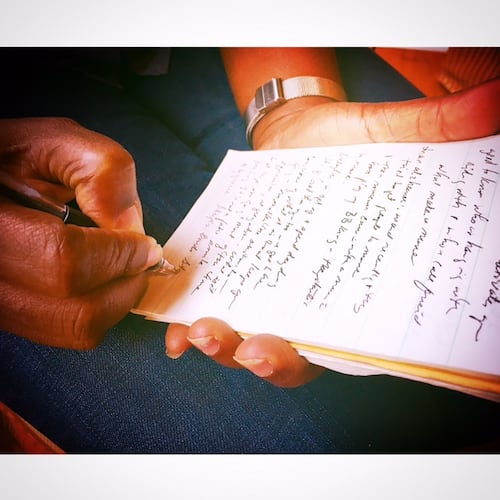It was heartening to learn that rapper and now presidential candidate Kanye West suffers from bipolar disorder because finally there was a way to explain his behavior.
At the same time, I was saddened for him, for his family. Coping with mental illness can be hard for a lot of reasons. There’s always the nagging question of why me? The fear of what it means. And the biggie ― the unwarranted shame one may feel.
None of us wants to be thought of as, well, crazy.
That’s changing thanks in no small part to media coverage and the increasing numbers of celebrity figures who’ve been willing to share their struggles with the public.
People are still talking, for instance, about former first lady Michelle Obama’s recent admission that she has been dealing with “low-grade depression,” which she attributes to the coronavirus quarantine, political strife, and U.S. race relations.
I’ve felt the same way. A lot of us have.
Even if crises aren’t new to you and you’ve somehow managed to build coping skills, it can feel different when there’s a lot going on at once.
There’s COVID-19, of course, but there’s also an economic recession and racial upheaval.
For us Black Americans, racism can be especially crushing to our mental health.
Daniel H. Gillison Jr., CEO of the National Alliance on Mental Illness, recently called racism a public crisis.
“The effect of racism and racial trauma on mental health is real and cannot be ignored,” Gillison said. “The disparity in access to mental health care in communities of color cannot be ignored. The inequality and lack of cultural competency in mental health treatment cannot be ignored.”
Too often it is ignored.
Credit: Contributed
Credit: Contributed
Despite the erasure of stigma, Blacks remain skeptical about both the benefits of mental health care and those who provide that care, according to Dr. Adolph Brown, author of “Two Backpacks” and the education classic ”This Is Real Talk.”
Brown, a clinical psychologist and self-described social justice advocate, had a lot to say about that in an email exchange.
Blacks, he said, harbor a steely distrust of medical professionals that dates as far back as slavery.
“Running away from slavery was considered a disease called ‘drapetomania’ and often treated with amputation of the extremities,” he said. “During the Reconstruction Era, mental health providers diagnosed former slaves, especially Black activists who threatened the racist status quo, with schizophrenia characterized as being violent, paranoid, and hostile.”
It has never been more critical than now to lay that burden down.
If, for some reason, you’re experiencing disruptions in your daily activities like sleeping, eating, enjoying once pleasurable activities, working, socializing, or thought processes, you might need help.
Life can throw at us a host of stressors from family crises, to job-related issues, to health concerns. When those are piled on top of the added stress of a “new normal,” Brown said many of us may lack the coping capacities and strategies to effectively deal with the emotional burden these may cause on our own.
“The mental and physical consequences of stress are real and in a time of mandatory lockdowns where access to support systems and other outlets for stress reduction and management like fitness clubs and gyms are closed or limited, many individuals are likely to displace unhealthy emotions in inappropriate ways,” he said. “In the absence of effective coping mechanisms, we sometimes hurt people who did not hurt us.”
This is an example of what Brown calls “bleeding on people who did not cut you.”
“As frustrations, agitations and irritations grow with the limited freedoms surrounding moving to a COVID-free society, the displacement of these negative emotions have become center stage,” he said.
Black men are particularly at risk. While they are 20% more likely to experience mental illness than the general population, Brown said, they rarely have at their disposal the proper outlets to process and talk about their emotional experiences, which increases feelings of isolation, anger and resentment and creates an emotional volatility.
“We all are broken and flawed, and therapy can be the glue to put us back together or keep us from falling apart,” Brown said. “Until the time of commencing mental health therapy, self-care must be made a priority.”
Friends and family can help, he said, but it’s important to know their limits.
Beginning a conversation with a loved one is a good first step.
“Listen intently to allow (loved ones) to share as much or as little as they desire, but do not attempt to diagnose their behavior,” Brown said. “It’s best to ask open-ended questions while bringing attention to their overall well-being. Lastly, offer them support, encouragement, and information in finding professional mental health support.”
What else can you do?
Brown suggested adding these steps to your routine:
• Maintain structure in your daily life to minimize the unpredictable. Include set times for activities that are important to you.
• Limit viewing of social media to regulate how often you fuel your anxiety and depression. Check news on reputable sources only.
• Find things for which you are grateful. Gratitude invites happiness. Recalling things for which you are grateful every day has been demonstrated to train your brain to think more positive.
• Find a reason to laugh. Just by watching funny YouTube videos or your favorite sitcoms, you can lower your stress. Laughter helps us to learn better, improves our health, and most importantly it’s contagious.
I hope this helps.
Find Gracie on Facebook (www.facebook.com/graciestaplesajc/) and Twitter (@GStaples_AJC) or email her at gstaples@ajc.com.
About the Author
The Latest
Featured




